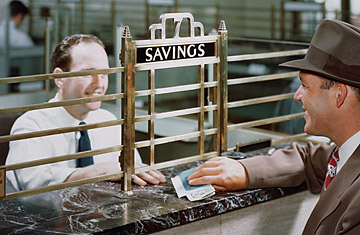
Business is booming for Ed Speed, which is a little odd, considering he lends money for a living. But that's the story of credit unions nowadays, including the one in southeastern Texas that Speed runs, where real estate lending has doubled over the past five weeks, and auto loans are on track to grow 40% to 60% in October.
Members-only nonprofit credit unions are having their turn in the sun as years of sticking to boring, old-fashioned banking practices — they typically hold the mortgages they make on their own books and only dabble in subprime — put them in a position to grab market share while national banks, auto finance companies, credit-card outfits and private student-loan firms cut back on loans. "In good times, you'd say these guys are much too conservative," says George Hofheimer, chief research officer of the credit-union-focused Filene Research Institute. "But in times like these, it's just what the doctor ordered."
Credit unions aren't shy about having money to lend. Speed's outfit, the 126,000-member Texas Dow Employees Credit Union (TDECU), has been running TV spots since August and is doubling its ad budget for the fourth quarter. (At times, TDECU has been accused of being too aggressive: community banks, which have also been faring relatively well, and the FDIC loudly objected when one ad painted the entire banking industry as "under a dark cloud.") To meet loan demand, TDECU is borrowing from corporate credit unions and the Federal Home Loan Bank of Dallas, but even then "we may not have enough money to go around," says Speed — especially now that car dealerships, jilted by the finance arms of auto companies, are flooding the credit union with calls.
The lending spree is a scene playing out at credit unions across the country, though that's not to say the industry has escaped the financial meltdown completely unscathed. Some 21% of the nation's 8,000 credit unions have lost money in at least one quarter so far this year, and 14 credit unions have run into enough trouble that they've had to be taken over, according to the National Credit Union Administration, the federal regulator that backs deposits at credit unions much like the FDIC does at banks. Credit unions that made home loans in bubbly markets like California or those that jumped heavy into commercial lending, especially for construction projects, have been hurt the most.
Now that the credit crunch is rolling full-tilt into the real economy, even credit unions with the benefit of geography likely won't be able to escape the effects of recession. At the 66,000-member Unitus Community Credit Union in Portland, Ore., loan volume is up this year in nearly every category — 32% in mortgages, 37% in student loans, 12% in credit cards — but so are delinquencies. Since the beginning of the year, late payments have increased from 0.17% to 0.40%.
Even by the standards of credit unions, which tend to have much lower delinquency rates than banks, those figures are worth bragging about, but Unitus CEO Patricia Smith isn't standing idly by. Three weeks ago, she hired the credit union's first work-out specialist to start pouring through loan data and making pre-emptive calls to people who might need help — the sort of down-home, we-care solution credit unions sell themselves on.
And they do continue to sell themselves. In early October, Smith was one of nine CEOs who signed onto a newspaper ad touting the benefits of credit unions. "We are financial institutions without shareholders or Wall Street investors," the ad read. "The credit unions of Oregon are owned by 1.4 million regular people — Oregonians just like you." Says Smith: "It's very unfortunate what's happened in the banking industry. There are a lot of good people hurting. But from our standpoint, it does give us an opportunity to say we're here. And we're still lending."
